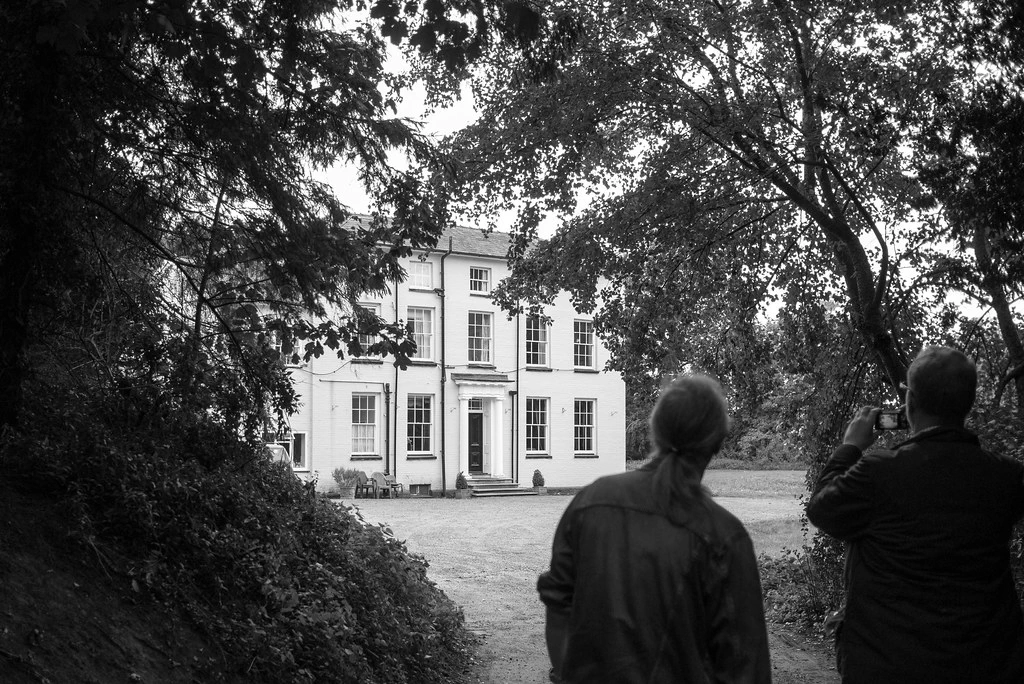“A Vignette” is the last ghost story written by the English medievalist and author M. R. James (1862–1936),[1] published posthumously in November 1936 in The London MercuryMonthly literary magazine published from 1919 until 1939.Monthly literary magazine published from 1919 until 1939..[2]
Told as a first-person monologue, it has been speculated that the story is semi-autobiographical, based on an incident in James’s early life, when he was living in the rectory at Great Livermere, Suffolk, where his father was the rector of St Peter’s Church.[3][4]
Synopsis
The narrator is reminiscing about his childhood in a country rectory, next to a large park from which it is separated by a narrow strip of ancient trees known as the Plantation, accessed through a gate of split oak from the path which circles the garden. For someone to open the gate they must reach through a small square hole in it and lift a hook. On passing through this gate another of iron is encountered, leading to the park.
As a young boy, the narrator is walking home through the park one evening. For part of the way a villager walks with him until they reach the iron gate leading to the Plantation, at which point the villager stops and watches him. By then it is starting to get dark, and the boy feels that someone is in the woods with him, wearing a hood or cloak.
Soon after, the narrator starts having a recurring nightmare, which always begins with him looking out of his bedroom window and seeing the gardener and his assistants working. As evening approaches they leave as quickly as they can. From his window the narrator scans the now empty garden looking for movement, and sees some disturbance by the wooden gate. As he continues to look out of the window he becomes aware of the sound of footsteps on the stairs behind him, and a hand on his door. Then he wakes up.
One afternoon the narrator is alone in the house, reading a novel which includes an arresting account of someone walking up a solitary lane by an old mansion at dusk, describing a “skulking aspect peering out of the shade of its neglected old trees”;[a]The quotation is from J. S. Le Fanus’ The House by the Churchyard.[5] the words lead him to look at the Plantation out of his window. He sees that the wooden gate is shut and that no-one is on the path beyond it, but something “white or partly white” can be seen through the small hole in the wooden gate. The narrator goes down to the gate and looks through the small hole, and sees a face on the other side, its forehead fringed with a white shroud. The face has large eyes, staring directly at the narrator, and although expressionless, not monstrous or spectral, the narrator believes it to be malevolent, and in a panic he flees. After reaching a safe distance he looks back, and sees a draped form shambling through the trees of the Plantation.
Even as an adult the narrator says he would still be reluctant to walk past the gate to the Plantation. The story concludes with him wondering if such creatures like the one he saw as a young boy were once a regular sight, but are now only seen occasionally at specific locations.
Commentary
“A Vignette” was originally intended to be published in The London MercuryMonthly literary magazine published from 1919 until 1939.Monthly literary magazine published from 1919 until 1939.‘s 1935 Christmas edition, but was not submitted until 12 December, too late for inclusion. James himself seems not to have been happy with the story, writing in his covering note:
See also
- M. R. James bibliographyList of the works written by M. R. James.
Notes
| a | The quotation is from J. S. Le Fanus’ The House by the Churchyard.[5] |
|---|

